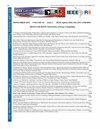Deep Learning and object detection for water level measurement using patterned visual markers
IF 1.3
4区 工程技术
Q3 COMPUTER SCIENCE, INFORMATION SYSTEMS
引用次数: 0
Abstract
Flooding is one of the most impactful natural disasters, causing significant losses and prompting extensive research into monitoring water levels in urban streams. Current technologies rely on pressure and ultrasonic sensors, which, while accurate, can be susceptible to damage from floods and are often costly. As an alternative, ground camera approaches offer a low-cost solution; however, most of these methods use raw images from the water stream and are sensitive to environmental factors. We address this gap with a dataset comprising a visual marker with black bars indicating the water level, which we refer to as "barcode panel". We employed various deep learning algorithms to predict the water level and compared their performance. The proposed approach was evaluated using classic classification and error metrics. The models demonstrated accuracy in detecting the water level. These promising results provide important insights for practical applications and future studies.利用模式化视觉标记进行水位测量的深度学习和目标检测
洪水是影响最大的自然灾害之一,不仅造成重大损失,还促使人们对城市溪流的水位监测展开广泛研究。目前的技术依赖于压力和超声波传感器,这些传感器虽然精确,但容易受到洪水的破坏,而且往往成本高昂。作为替代方案,地面摄像方法提供了一种低成本的解决方案;然而,这些方法大多使用水流的原始图像,对环境因素比较敏感。为了弥补这一不足,我们使用了一个数据集,该数据集由表示水位的黑条视觉标记组成,我们称之为 "条形码面板"。我们采用了各种深度学习算法来预测水位,并比较了它们的性能。我们使用经典的分类和误差指标对所提出的方法进行了评估。这些模型在检测水位方面表现出了准确性。这些充满希望的结果为实际应用和未来研究提供了重要启示。
本文章由计算机程序翻译,如有差异,请以英文原文为准。
求助全文
约1分钟内获得全文
求助全文
来源期刊

IEEE Latin America Transactions
COMPUTER SCIENCE, INFORMATION SYSTEMS-ENGINEERING, ELECTRICAL & ELECTRONIC
CiteScore
3.50
自引率
7.70%
发文量
192
审稿时长
3-8 weeks
期刊介绍:
IEEE Latin America Transactions (IEEE LATAM) is an interdisciplinary journal focused on the dissemination of original and quality research papers / review articles in Spanish and Portuguese of emerging topics in three main areas: Computing, Electric Energy and Electronics. Some of the sub-areas of the journal are, but not limited to: Automatic control, communications, instrumentation, artificial intelligence, power and industrial electronics, fault diagnosis and detection, transportation electrification, internet of things, electrical machines, circuits and systems, biomedicine and biomedical / haptic applications, secure communications, robotics, sensors and actuators, computer networks, smart grids, among others.
 求助内容:
求助内容: 应助结果提醒方式:
应助结果提醒方式:


